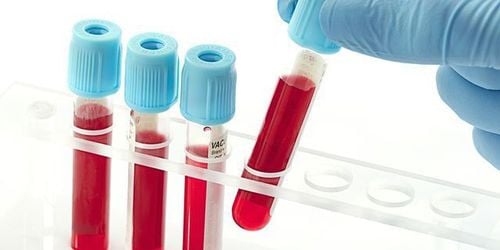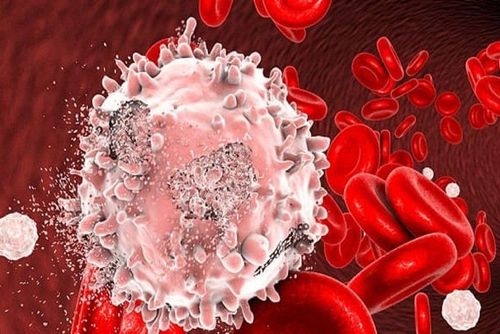Leukopenia can be caused by inherited autoimmune diseases, immune system deficiency, some diseases, or using certain medications that cause side effects.
1. What causes leukopenia?
Some factors cause leukopenia by affecting the production of white blood cells in the bone marrow. While some other factors cause leukopenia by destroying white blood cells. In addition, leukopenia can also be caused by some treatments or medications.
The causes of leukopenia are:
- Viral infections: Acute viruses like the common cold or flu can temporarily reduce white blood cells. In the short term, viral infections can disrupt the production of white blood cells in the bone marrow.
- Blood and bone disorders: Conditions such as aplastic anemia, hypersplenism, or myelodysplastic syndrome can lead to a reduction in white blood cells.
- Cancer and leukemia: Cancer and blood disorders like leukemia can damage the bone marrow, leading to leukopenia.
- Infectious diseases: Diseases like HIV/AIDS and tuberculosis can lead to reduced white blood cells.
- Autoimmune disorders: When the body fails to recognize its cells and starts attacking them, it can cause conditions like lupus, systemic lupus erythematosus (SLE), Crohn's disease, and rheumatoid arthritis.
- Congenital disorders: Conditions like Kostmann syndrome and myelokathexis syndrome, which are hereditary, can affect white blood cell production.
- Malnutrition: A deficiency in certain vitamins and minerals like vitamin B12, folate, copper, and zinc can cause leukopenia.
- Cancer treatment: Treatments such as chemotherapy, radiation therapy, and bone marrow transplants can suppress white blood cell production in the bone marrow, leading to leukopenia.
- Medications: Some medications, such as those used to treat multiple sclerosis, epilepsy, depression, antipsychotics, immunosuppressants, antibiotics, and drugs for drug addiction, can cause leukopenia.
- Additionally, in the early stages of infection, when the body is fighting off an infection, it can lead to leukopenia. This condition is known as pseudo-leukopenia.

2. How to detect leukopenia?
Leukopenia can be diagnosed by blood tests to examine the whole blood. Leukopenia test indicators include:
- WBC - The number of white blood cells in a volume of blood: the average value is about 4,300 - 10,800 cells/mm3. WBC is reduced in cases such as aplastic anemia, viral infection (HIV, hepatitis virus), vitamin B12 or folate deficiency, use of certain drugs such as phenothiazine, chloramphenicol, etc.
- LYM - Lymphocytes (cells with immune capacity including T lymphocytes and B lymphocytes): average value is about 20 - 50%. Lymphocyte reduction in cases of HIV/AIDS, tuberculosis, cancer, severe typhoid, malaria, etc.
- NEUT - Neutrophils (help fight fungal and bacterial infections): average value is about 60 - 66%. Neutrophil reduction in cases of aplastic anemia, use of immunosuppressive drugs, heavy metal poisoning, etc.
- MON - Monocytes (play a role in fighting bacteria, viruses, fungi and healing damaged tissue due to inflammation): average value is about 4 - 8%. Monocyte reduction in cases of aplastic anemia or use of corticosteroids.
- EOS - Eosinophils (antiparasitic): average value is about 0.1 - 7%. Eosinophilia is due to corticosteroid use.
- BASO - Basophils (plays an important role in allergic reactions): average value is about 0.1 - 2.5%. Basophilia can be due to bone marrow damage, stress, or hypersensitivity...
3. Symptoms of leukopenia
Leukopenia has no specific symptoms, however, when leukopenia occurs, the body's resistance will be weaker and more susceptible to infection. Symptoms of infection are:

4. Treatment of leukopenia
In mild cases of leukopenia, treatment may not be necessary, but only attention should be paid to rest and nutrition. In more severe cases of leukopenia, treatment depends on the cause:
- With antibiotics when infected.
- By immunosuppressive drugs.
- Change medication if leukopenia is caused by the drug.
- Treat underlying infections.
- Stem cell transplant.
- Stimulate bone marrow cells to produce more white blood cells
A leukopenia test is a way to detect leukopenia so that the cause can be found and treated promptly.
Vinmec International General Hospital is a comprehensive facility for the examination, treatment, and monitoring of various diseases. The hospital is equipped with modern facilities and state-of-the-art testing equipment. It boasts a team of highly specialized and experienced doctors who are skilled in conducting examinations, collecting test samples, and following precise procedures to ensure accurate results. This enables doctors to diagnose conditions effectively and provide guidance on medication use, as well as advice on lifestyle and nutrition to help minimize complications associated with the disease.
To arrange an appointment, please call HOTLINE or make your reservation directly HERE. You may also download the MyVinmec app to schedule appointments faster and manage your reservations more conveniently.





